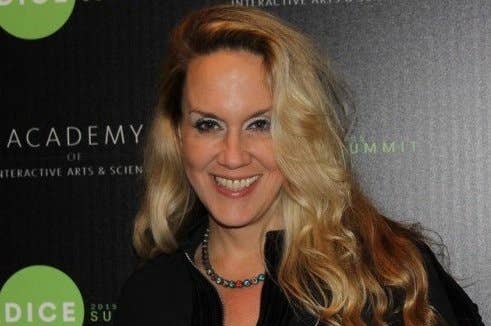Validation critical for developer ecosystem - Romero
Veteran designer Brenda Romero on the importance of pride and how Minecraft rebooted the graphics arms race
Brenda Romero, longtime designer and program director for UC Santa Cruz' Games and Playable Media track, gave a passionate speech at the recent DICE Summit, talking about what a great game looks like. She touched on how a really good game gives both the creator and the player joy, but she also described how an interview question years ago wound up costing her a job. When asked whether she'd rather work on a game that won lots of awards or made a lot of profit, she chose awards. In retrospect, however, she told GamesIndustry.biz that she was naïve at the time.
"My answer was naïve because I had worked at the same company for 20 years and that company had produced multiple award winning projects... I was fortunate to join a team of people that knew how to make good games. To me, getting awards equals making a great game equals making a lot of profit... To me those things were kind of one in the same," she said.
Indeed, game creation is an art form, and similar to a painter who's driven by pure passion to convey a certain vision on a canvas, developers are seeking the same sort of gratification. And with that gratification comes immense pride that should not be underestimated. It's passion and pride, not profits, that breathes real life into the industry.
"It's a craft ecosystem, you're practicing your craft and getting feedback that your craft was well practiced. That is critical at the heart of why game developers do what they do"
"For people who got into the game industry and wanted to make games, the question wasn't how much money can I make - in fact, many are politely surprised that they can do well. With almost zero exception, a programmer can do better outside the game industry than they would do inside the game industry. Gamers don't give us money just because they want to - it's this love of games and that's how the ecosystem goes on.
"It's these two groups of people who are necessary to get a game out. Developers do need to believe that they are making something great. At least they're trying for it. The second that head is chopped off, your drive to make something goes away. There's that sense of 'I want to make something I'm proud of, I want to make something that I want to brag about, I want to look at that thing on the shelf. I want to go to Greenlight, to Steam and see my game, and I want to see people talking about my game on Twitter, I want to see a community forming around my game.' All that stuff, you want that because you love it when you send it out. People saying nice things about it are a validation of that. It's a craft ecosystem, you're practicing your craft and getting feedback that your craft was well practiced. That is critical at the heart of why game developers do what they do," she continued.
While business suits and creatives can clash at times, at the end of the day it's about finding the right people to recognize what makes a game great and who can help monetize that effort without tarnishing the product.
"It takes a special person, a unique set of talents, where somebody isn't just a good salesman but can actually spot a great game... it takes someone who has a degree of game literacy as well as player literacy, so that they know it's something they can sell and be aware of the changing ecosystem," Romero noted. "Finding out a way to do that that doesn't knock the head off the craft loop, so game developers still feel that they're creating something great, they do not feel they're taking advantage of the player, and they are proud of what they create [is key]."
"There were massive projects in the works that got rebooted entirely because of Minecraft. Gameplay matters. What's happening in the player's head matters. Minecraft at least in my experience is just shockingly unprecedented"
In the AAA space with escalating budgets and consumer expectations, pursuing a project out of passion doesn't always pan out. That being said, Romero is hugely encouraged by the companies who are investing in smaller bets. She did not mention any one company by name, but Ubisoft's work on titles like Child of Light and Valiant Heart certainly comes to mind.
"Behind the scenes I'm also seeing companies taking lots of smaller bets in the one to five million dollar range, which is still a large amount but nothing compared to a AAA title. I'm seeing game publishers taking lots of smaller bets, knowing that maybe of these 10 bets one is going to pan out. That's happening now. People look at things like say, Minecraft, like FTL, and you can potentially have the same return on investment," she remarked.
Speaking of Minecraft, Romero - who still plays Minecraft marathons with her kids - said that the title completely changed the development landscape across the board. It was revolutionary. "Minecraft was the reboot of the graphics arms race - it literally reset projects," she said. "There were massive projects in the works that got rebooted entirely because of Minecraft. Gameplay matters. What's happening in the player's head matters. Minecraft at least in my experience is just shockingly unprecedented."
What Minecraft proved is that graphics no longer make or break a game the way they might have in the '90s. "To me seeing companies making smaller bets is exciting. And players are much more willing to explore things whereas in the past the reaction may have been 'look at the shitty graphics.' I feel like we're past that point," Romero said.

